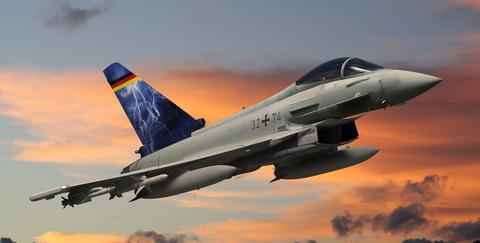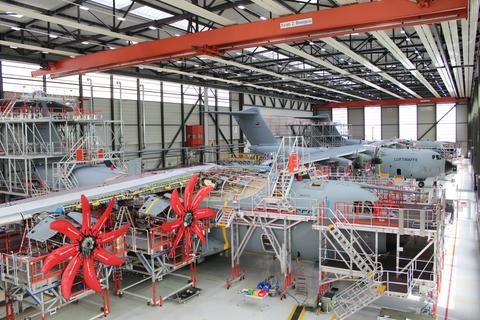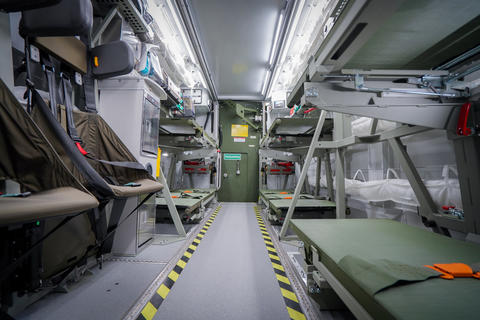Industry needs fundamental decision on Eurofighter by 2025
Maintaining national sovereignty also includes a powerful fighter jet fleet as well as technological capabilities in military aircraft construction. The Eurofighter fulfils both for Germany. However, according to current planning, production of the Eurofighter will end in 2030.
As the largest cooperation project of the European defence industry, the Eurofighter forms the backbone of several European air forces. In Germany, this weapon system is not only of overriding strategic importance for the Luftwaffe, but also the structurally-determining military aviation programme that shapes our industrial landscape nationwide.
Production gap of ten years threatens
According to current planning, production of the Eurofighter in Germany will end in 2030 with the delivery of the last tranche 4 aircraft for the Bundeswehr. Since the future European air combat system FCAS is scheduled to be operational from 2040, there is currently a production gap of ten years.

Without an early follow-up commission (Tranche 5) by the Federal Government, there would be a threat of the end of military fighter aircraft construction in Germany – and a corresponding loss of jobs, tax revenues and, in particular, of cutting-edge technologies and competencies in our industry, which have been built up over decades. “Do we want to continue building military aircraft in Germany? If the answer is ‘yes’ – not least in view of the geopolitical situation – then we must quickly build an industrial bridge to the future in addition to tranche 4 Eurofighter currently under construction in Germany,” says Dr. Michael Schöllhorn, CEO of Airbus Defence and Space. “This means in concrete terms that we still need the commission for the further development of the Eurofighter and a decision of principle on the commissioning of the 5th tranche.”
Eurofighter secures 25,000 jobs
The management consultancy PwC Strategy& recently carried out a study on the economic implications of tranche 4 of the Eurofighter programme for the German economy on behalf of the BDLI. It shows that the Eurofighter programme secures 100,000 European jobs, 25,000 of them in Germany. A total of 120 suppliers are involved throughout the Republic.
The contribution of German industry to the programme generates a significant amount of tax revenue as well as contributions to social security and pension funds. The bottom line is that the Eurofighter programme not only makes a significant contribution to Europe's security, but every euro invested also generates a multiple for Germany's gross domestic product.
The aerospace industry in Germany therefore needs a commission from the Federal Government for the further development of the Eurofighter and thus a fundamental decision on the future of the system during this legislative period.
Status: Nov 2023
Germany renews A400M contract with Airbus
Germany is the largest A400M customer. Now the Federal Republic has extended the in-service support contract with Airbus in the long-term. A new A400M maintenance facility will also open in Wunstorf, Lower Saxony.
The German Air Force currently operates 40 of the 53 A400Ms on order. The entire fleet is stationed at Wunstorf Air Base, where Air Transport Squadron 62 is based.
All encompassing support
In early July 2023, the Federal Office of Bundeswehr Equipment, Information Technology and In-Service Support (BAAINBw) in Koblenz renewed the A400M In-Service Support contract with Airbus. The contract has a duration of 7.5 years and serves as an extension of the A400M In-Service Support for the Air Force that has been in place since December 2014.
The contract extension shows a long-term commitment of the German government to the A400M. Luftwaffe and Airbus have jointly made great efforts in recent years to improve the availability and operational capability of the A400M, which has become an indispensable part of the Air Force fleet. The fruitful cooperation can be deepened with the contract.

Industrial technical support for the German Air Force's A400M fleet covers a wide range of services provided by the Airbus Support Center in Wunstorf Air Base and the central Centres of Competence in Getafe, Spain.
Airbus will cover and ensure scheduled Maintenance, Repair and Overhaul (MRO) services from its main MRO base in Manching near Munich, as well as from Wunstorf Air Base near Hanover and Hanover Airport.
New A400M maintenance facility to open in Wunstorf in 2027
The contract also foresees the construction of a new A400M maintenance facility in direct proximity to Wunstorf Air Base. The facility will provide MRO services from 2027 and will also house the Airbus A400M Support Center where around 300 staff will work hand-in-hand with suppliers and customer representatives. The construction work will commence with immediate effect.
Status: July 2023
Transport, Treat, Save Lives: First Protected-Wounded Transport Container
Airbus Defence and Space has now handed over the first of 13 protected-wounded transport containers (GVTC) to the German Armed Forces. From now on, their medical personnel will use them to save lives: In the containers, they can safely transport the sick, injured and wounded to hospitals or field hospitals - and even provide medical care while doing so.
"Our protected-wounded transport containers improve the Bundeswehr's rescue chain and ability to recover, transport and treat the wounded in crisis areas," said Harald Mannheim, managing director of Airbus Defence and Space GmbH. "In this respect, the GVTC is further proof of how we and our state-of-the-art technologies help all those who help others."
The first recently delivered GVTC is used as a so-called "proof-of-concept". This means that the Bundeswehr will put the container through its paces and train its medical personnel on it. The GVTC then goes into series production. The twelve series GVTCs are then to be handed over to the German Armed Forces between 2024 and 2026.

The GVTC: Flexible, simple and safe
The GVTC is based on the international ISO standard 20-foot container. It is around 6 meters long and can easily be attached to existing Bundeswehr trucks. Cranes or other special devices are not required.
In the GVTC, two paramedics can treat up to eight patients and, for example, monitor their vital signs and oxygen saturation, perform a defibrillator operation or have patients ventilated via the integrated oxygen-generation system. The container also protects its occupants and the equipment on board from chemical warfare agents, shelling and heavy explosions. A power generation unit enables self-sufficient operation for hours, while the high-performance air-conditioning system allows the GVTC to be used in extreme climatic conditions.
Status: May 2023
FCAS on the way to the first flight
The future European air combat system FCAS is entering the demonstration phase. FCAS is far more than a new combat aircraft. It is a system of systems designed to safeguard Europe's defence capability.
Germany, France, and Spain have commissioned Airbus, Dassault, Indra, Eumet and their industrial partners to develop a demonstrator for the European air combat system FCAS (Future Combat Air System). This agreement between industry and the governments involved paves the way for the first flight this decade and is a major step forward for Europe's flagship programme in the defence sector.
The contract with a total volume of €3.2 billion for the so-called Demonstrator Phase 1B will cover the development work on the FCAS demonstrator and the other components of the project for the next three and a half years until 2025. FCAS is to replace the German and Spanish Eurofighters and the French Rafale from around 2040.
More than a new fighter plane
Chancellor Olaf Scholz made it clear at the ILA in June 2022 that Germany and Europe must remain technologically up to date – especially in defence and security. This also means that the next combat aircraft will be developed in Europe. Shortly before, the federal government had already announced the development and ordering of 15 Eurofighters equipped for electronic warfare – a technology that is extremely important in modern threat situations. This will flow into the development of FCAS.
In contrast to the previous systems, FCAS is not just a combat aircraft. The FCAS program will consist of a combat aircraft, drones and an information and mission management system (Air Combat Cloud). Airbus is leading the Combat Cloud and is acting as the industrial coordinator of the project in Germany.

First successful tests
The first major flight demonstration with manned and unmanned aircraft in Europe took place at the end of 2022 under the leadership of Airbus and with the participation of the German Armed Forces and other partners. Two combat aircraft, a helicopter and five drones operated successfully together. In another test, a drone took off from a flying A400M transport aircraft for the first time. In addition to Airbus, the Bundeswehr, DLR and other partners were also involved in the test. These demonstrations pave the way for FCAS' first flight, which is planned for 2028-29.
Status: Jan 2023
Lessons from the Ukraine war:
Only credible deterrence protects In view of the Russian war of aggression on Ukraine, Europe finally needs a coordinated, defence-oriented security policy, says René Obermann.
Almost overnight, Germany recently adopted the most far-reaching changes to its foreign and security policy in 30 years. Chancellor Olaf Scholz announced a special fund of 100 billion euros for defence and wants to spend more than two percent of the gross domestic product on the Bundeswehr every year in future. If implemented in this way, Berlin would not only fulfil a long-agreed NATO commitment, but would actually exceed it.
These changes have come with a speed and decisiveness that stunned even seasoned security experts. The new course is due to the realisation that our freedom is under concrete threat. The atrocities of the current war, the suffering and fierce resistance of the people of Ukraine have created a great sense of urgency. Suddenly, EU members are reaching that consensus that was often painfully missing before. This could result in tectonic shifts.
Hopefully, the next few years will see the emergence of a modern, integrated and efficiently managed European armed force. This could give more weight to a likewise integrated European foreign policy, because it would effectively deter aggressors. It is encouraging that Europe is finally pulling together - but the new unity must last beyond the current threat situation. That is why we must now initiate a long-term transformation of our security policy.

René Obermann
Only credible deterrence protects
In view of the Russian president's implicit threat to even use nuclear weapons if necessary, only credible military deterrence will ultimately protect us. As bad as it sounds, we must not be blackmailed by his arsenal of awfulness. In times of peace, politicians sometimes face nasty attacks when they pursue strategies that impose burdens on society in the short term but whose benefits only become apparent in the long term or, due to their preventive nature, do not become apparent at all - except precisely in the form of peace, which we have long taken for granted.
This also applies to defence policy. And now, after the turn of the times? We must protect our politicians better and support their work more strongly. How else are they to muster the strength and courage for prevention policy? Such a policy is all the more urgent as the world seems to be entering a permanent crisis mode. The next conflicts are already looming or running in the background.
Against the backdrop of the Ukraine war, the German government has decided to change its paradigm. Despite the depressing current situation, it must now also be a matter of facing up to the pressing questions of the future: Can we permanently flip the switch to avert wars in Europe in the future through credible deterrence? How do we overcome short-term thinking in legislative periods when it comes to geopolitical developments? Will we finally succeed in developing strategic foresight, for example in questions of raw material supply?
Good cooperation instead of endless debates
Incidentally, these questions also arise during election campaigns. The last Bundestag election campaign was a total failure in terms of strategic foresight. Foreign economic issues and geopolitical developments played almost no role. At least the reactions of the past weeks give hope that Europe is capable of change - and unity. It is up to all EU member states, but especially France and Germany, to now push for the necessary changes and, if possible, to take all partners with them.
For a defensible EU foreign policy, we need good cooperation, but not endless debates and not necessarily unanimity in the European Council. In Germany, we must finally be prepared to make comprehensive structural adjustments, for example in public procurement law and the procurement of the Bundeswehr. Moreover, despite the Brexit, close cooperation between the EU countries and the UK is indispensable when it comes to developing modern security systems.
Furthermore, we must no longer view our security industries through national glasses. Instead, we must strengthen joint projects and efforts to secure European sovereignty. The focus must be on the common result for Europe - the time of particular, national interest representation is over. Only in this way can we achieve sovereignty in key technologies that serve Europe's security.
A jolt must go through the old continent
But it is not only higher defence budgets that are needed to jolt the old continent. The major industrial partners of the states on both sides of the Rhine must also take responsibility if we want to realise future projects such as the common European combat aircraft system, which goes by the abbreviation FCAS or Future Combat Air System. The core companies must be prepared to pool their expertise - out of conviction for a sovereign Europe.
We will not achieve the necessary technological leaps in FCAS if we threaten to divide ourselves over almost childish national leadership debates. Europe has a lot at stake in FCAS, which is on the threshold of entering the development phase - and not just militarily. For the programme also offers us the chance to decisively reduce our dependence on non-European providers in cloud consolidation. This much I can say: Airbus, which is based on multinational, European cooperation like no other company, is prepared to put everything on the line for this.
In the light of current events, it is not without a certain irony that Airbus had to fight for admission to the Dax 40 last year simply because we develop European defence technology. Our Eurofighters, for example, are currently a cornerstone of NATO missions in Romania, Bulgaria and Poland. Our A400M transport aircraft were used in the evacuation of Kabul in 2021. They are also playing a supporting role these days.
In future, there must be no more war in Europe
Not long ago, access to the capital market was to be made even more difficult for defence companies in the EU. The drafts of the new "social taxonomy" did not bode well in this respect. Some banks, also in Germany, had already announced that they would no longer finance important companies in the defence industry in future.
In the meantime, this taxonomy debate has fallen silent for the time being. Let's see if it picks up again later. In any case, it would not serve Europe's security. For one thing is certain: Democracy, human rights and freedom are not God-given; unfortunately, they must increasingly be defended. Precisely because of our German past, we have a duty to ensure that there is no more war in Europe in the future. But this can only be achieved if we demonstrate our determination to defend ourselves through credible deterrence.
The author: René Obermann is Chairman of the Board of Airbus and Co-Chairman Europe of the private equity firm Warburg Pincus.
Status: March 2022